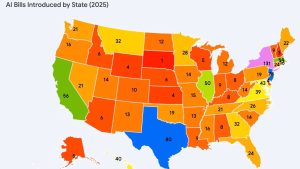As the debate surrounding link taxes advances, it is more vital now than ever to discuss the negative impacts of these types of legislation, both on the internet and for the news ecosystem. CCIA’s recent panel discussion on these policies at the state, federal, and global levels featured policy experts including Public Knowledge’s Lisa Macpherson, LION Publishers’ Chris Krewson, and internet attorney Cathy Gellis. Moderated by Techdirt’s Mike Masnick, the conversation focused on what these policies entail, their concerning ramifications, and why they are not the solution to increasing pressures on the journalism industry.
State, Federal, and Global Trends
Mike Masnick kicked off the discussion by noting the current state of the journalism industry and how, in response to disruption, some governments continue to push for mandatory online news payments, the most common form of which are “link taxes.” He emphasized that while these proposals have been the focus of many legislators, they are not a viable solution that centers on local and community publications.
Lisa Macpherson then explained link taxes, describing them as laws designed to force dominant digital platforms to pay news organizations for crawling, indexing, linking, and even displaying small snippets of their content. She noted that these laws create a contentious dynamic between technology companies and news publishers, fueling debates that center on the “winners” and “losers” in this exchange. Macpherson also discussed the two ways this trend is playing out in policy proposals:
- Creating a right for publishers to demand payments from digital services despite copyright and fair use precedent.
- Allowing news organizations to band together to illegally set pricing to receive these payments.
Chris Krewson shared insights from the publishing industry, explaining that large legacy organizations (ones that are increasingly finding themselves financially distressed and burdened by debt) are generally in favor of link taxes because of the potential for a cash influx. He went on to say that these organizations consider link taxes a possible lifeline. In contrast, Krewson emphasized the importance of digital services (like search engines or social media) for local publications, which rely heavily on them for visibility, noting that smaller publications see these taxes as a threat to their sustainability.
The Importance of Copyright Law
Cathy Gellis delved into the legal ramifications of these policy approaches. She explained that copyright law aims to benefit the public by ensuring access to information, and creating additional barriers to information that lives on the internet contradicts this constitutional mandate. Furthermore, Gellis warned that these kinds of measures could infringe on free expression and the news ecosystems of countries themselves, emphasizing the importance of factual and available news and information to a thriving democracy.
“If we divide up the world into what was yours, what was mine and we all have our little fences around our stuff, we’re not going to be sharing anything. That’s not good for the public interest. That’s not good for the discourse. That’s not something that copyright was designed to do. It was designed to make sure that the public had access to information and expression, but the more you allow fences around it, the less that flow and sharing actually happens.”
Cathy Gellis, Internet Lawyer and Policy Advocate
A History of Technological Disruption
Lisa Macpherson provided historical context to this debate, tracing the newspaper industry’s repeated attempts to seek legislative protections in response to technological disruptions. Discussing the 1930s Biltmore Agreement and the Newspaper Preservation Act in the 1970s, she explained these efforts have consistently failed to create sustainable solutions. Macpherson emphasized the importance of innovation and adaptation by publishers as seen by the greeting card industry’s adapting in response to disruption over the past years.
“It is about hedge fund ownership…it is about generations of technological disruption. It’s their own inability or unwillingness to innovate. It is not driven primarily by insufficient rights and [the U.S. Copyright Office] concluded that extending those rights is not going to be a meaningful solution to the problem.”
Lisa Macpherson, Policy Director at Public Knowledge
“The disruption of the internet was that it allowed for millions of different kinds of communities to form in all different ways. That’s really sort of the underlying thing that strikes me as what disrupted the news business. Then if we focus on the news business being just about the news and not about the community, you’re never going to get that back and just throwing a whole bunch of money at the problem.”
Mike Masnick, Copia Institute and Techdirt
Lessons from Canada and Australia
The panel also discussed recent international examples, including Canada’s Online News Act (C-18) and Australia’s News Media Bargaining Code. The panel criticized these models, explaining that they have not effectively aided smaller newspapers and publications. Despite receiving payments, it has led to short-term gains rather than a long-lasting impact. In Canada, the panel discussed the ongoing complications in fund distribution and massive decreases in traffic to the independent news websites that need views that come from digital services most.
The California Journalism Preservation Act (CJPA)
One of the most pressing instances of this link tax spread is AB 886, or the California Journalism Preservation Act. Scheduled to be heard in the State Senate Appropriations Committee at the beginning of August, the bill continues to make its way for a possible floor vote by the end of the state’s session, despite vast opposition from civil society, advocacy groups, and organizations alike.
Despite amendments to the bill that have it now mimicking C-18 in Canada, the proposal remains a harmful link tax with the power to uproot the foundations of information sharing on the internet. The panel also discussed this bill in particular, warning against its passage and discussing the flawed premise behind the bill as well as the wide-reaching implications should it be signed into law.
“Still, at the end of the day, it is attempting to use the great California Reagan idea of trickle-down economics where you pay the largest publishers and eventually, theoretically, and hopefully good journalism will come out the other side of that intestinal tract. I remain deeply skeptical.”
Chris Krewson, Executive Director at LION Publishers
“Canada similarly invented this new fund idea. It was not the same premise that was being brought forward at the federal level. There’s a twist on it in California now, but that law too does not solve the core problems we’ve talked about, which is the inhibiting of free expression and access to information on the internet that comes with forcing payments for links. Links are the basis of the internet and they allow everyone on the screen and everyone in this audience to access and share information in a free and open manner. Let’s not take that away.”
Lisa Macpherson, Policy Director at Public Knowledge
The consensus on this issue remains clear: link taxes will not save journalism and mandatory online new payments are not the solution lawmakers should be pursuing. Rather, fostering innovation, utilizing proven small business solutions, and reinforcing the importance of journalism in local communities are key to securing a sustainable future for news.
To learn more, watch the full event above or listen to it on the Techdirt podcast.



